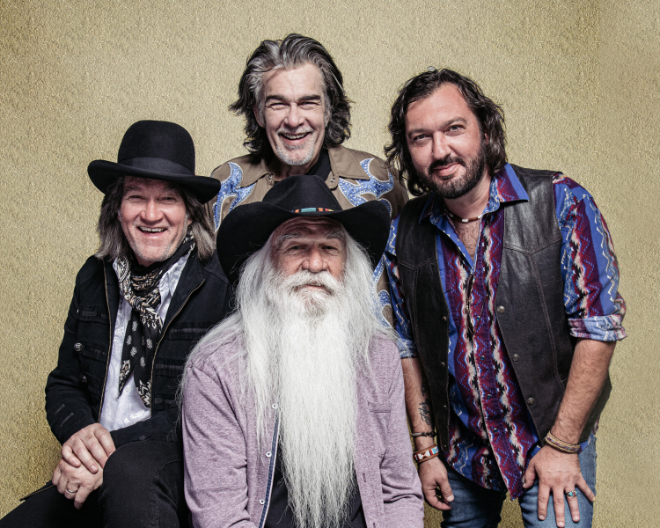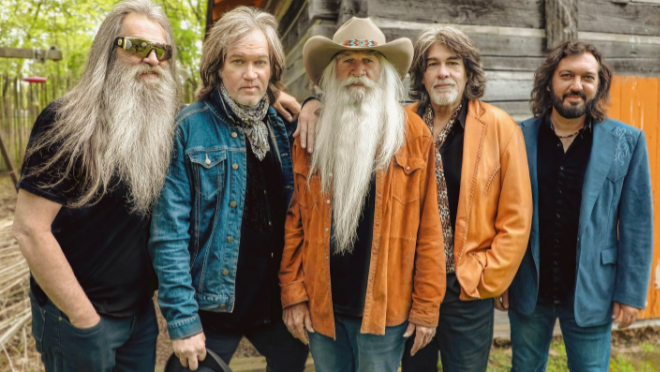WILLIAM LEE GOLDEN & THE GOLDENS premiere
“TAKE ME HOME, COUNTRY ROADS”
– with Web-Exclusive Interview
Musicians: WILLIAM LEE GOLDEN & THE GOLDENS
Video: “TAKE ME HOME, COUNTRY ROADS”
Writers: Bill Danoff, John Denver, Taffy Nivert Danoff
WILLIAM LEE GOLDEN & THE GOLDENS CREATE FAMILY HARMONY MAGIC WITH “COUNTRY ROADS”
We are proud to present the premiere of William Lee Golden & the Goldens’ “Take Me Home, Country Roads.”
Country Music Hall of Fame living legend William Lee Golden has always been associated with The Oak Ridge Boys. But this new set of albums is with his other boys—his sons.
William Lee Golden recalls, “I remember us driving through the country when my sons were younger. We would all sing “Country Roads”—and John Denver was a superstar. His music connected with just about everyone we knew and resonated how we lived our lives. I knew I wanted to feature this song at some point and now seems to be the perfect time. I hope you enjoy our version!”
William Lee has been the recognizable baritone for The Oak Ridge Boys since 1964-1987 and 1995-present. The Oaks were mainly gospel and he was the one who steered them into country music.
Last year, the Goldens released a three-album set which included Country Roads: Vintage Country Classics, Southern Accents: Pop & Country Rock and Old Country Church Gospel.
“Going into the studio with my boy, Chris and Rusty (The Goldens) was a dream come true,” shares William Lee Golden. “It was a way for us to get our minds off of the craziness in the world. Things had shut down and there were so many bad things happening, that we needed to focus on the good. We went into the studio and started recording songs for an album. We wanted them to be songs that inspired us throughout our lives. As we started compiling the list, it kept getting longer and longer, and more diverse. There were gospel, country and southern rock songs that we just couldn’t leave out. This resulted in a three album set called Golden Classics.”
They even received praise from The Oaks’ Joe Bonsall who says, “I am so proud of William Lee. This three-album set is masterful and heartfelt! Golden has always been about family and music and along with his boys they have created a musical masterpiece and besides that, I find the retro feel of the great old songs quite appealing.”
William Lee Golden and the Goldens consist of another recognizable singer, Craig Golden, along with Rusty Golden, Chris Golden and bass singer Aaron McCune. You can hear them give that family feeling—like you’re in the room with them—sitting around the living room, singing together and just having fun.
We spoke with William Lee Golden, Chris Golden and Rusty Golden about the family magic they created together in the studio.
When you listen to these three albums, you can hear William Lee Golden and the Goldens give that family feeling where you feel like you’re in the same room with them—sitting around the living room, singing together and just having fun.
WILLIAM LEE GOLDEN & THE GOLDENS Interview
with M Music & Musicians magazine publisher, Merlin David
What did you learn about yourself after you recorded each of these three albums?
William Lee: 34 songs were cut during the pandemic. We want the people to hear all that we’ve done.
Rusty: Because we’ve got 34 more songs to record! (Laughs) I learned new ways to sing because of Ben Isaacs and Michael Sykes’ contribution. They’re just geniuses.
William Lee: They just know so much about producing and arranging harmonies. They would be in the control room during the sessions—singing the harmonies, and they taught Chris and Rusty chord structures in singing harmonies—different than what these guys were used to singing.
Why are these albums important to you?
William Lee: I took my sons back to where I came from. This is how it all started out for me, as a little kid—playing music and singing with my sister, who was a little older. She played mandolin and I played rhythm guitar, when I was seven years old. I used to play guitar and we would sing duets—old country songs. Later, my little brother joined us singing—and we then had a trio. We’d get to sing once a week on Granddaddy Golden’s radio show. From there, we’d sing in little churches in our part of the country—south Alabama and northwest Florida—and little high schools and different events. It was fun.
How were these albums different from the way The Oaks approached Front Porch Singin’?
Rusty: My Dad got to choose every song. (Laughs) That’s the difference!
William Lee: We started doing this project about a week or so before The Oaks went into the studio with Dave Cobb. And we had already recorded 13 old gospel songs when I went in the following week with the Oaks. Then, when I finished Front Porch Singin’, I came back to the studio with Chris and Rusty and we finished recording the second and third albums. We recorded from August through October for all three projects.
Chris: But it all started in this room we’re in right now. It started around this grand piano. It’s a nice beautiful grand piano. It’s actually the first piece of furniture Dad bought for this house. He actually bought this before he bought a bed!
This family project must be special in so many ways.
William Lee: This is the type of music we did when we got together and kept singing—old songs, great songs. I wanted to go back to the songs that gave us hope, feeling and love in our heart throughout the years. This project started because I wanted to get together with my sons. They’re both extremely talented. Craig’s talented, but these guys (Chris and Rusty) are musicians, singers and record producers. They do all of it and they’re multi-talented. Chris plays mandolin, acoustic and rhythm guitar, drums and even piano on the Tom Petty song.
From a songwriter’s perspective, how do these classic songs inspire you?
Rusty: When you hear great classic songs, a songwriter’s first instinct is “Wow! I wish I’d have thought of that idea!” The really good ones hit me that way. When I record songs that somebody else wrote, I try to do the type of songs I wished I would have written.
What are your favorite memories from doing these three albums?
William Lee: Getting my sons together and allowing them to put their musical feelings into all this wonderful music. From 1987-1995, my sons and I spent about eight years doing music together. Playing music as a family—that’s what I loved. I gained a new respect for my sons as talented and seasoned musicians. They have a great feel for music. It has simplicity but a heart-felt feel. We had an amazing group of musicians in the studio with us. It was a tight-knit group of people. Ben Isaacs missed the first sessions, but he was watching the video monitors in the studio.
Chris: They have cameras all over the studio, so it really helped him be a part of those sessions.
Rusty: We videotaped everything we did. (Laughs)
William Lee: Jeff Panzer was directing the videos from LA. He’s a top hip-hop video producer. He did all of Nelly, Lil’ Wayne, Nikki Minaj and Drake’s first album videos. He captured all of our recordings—every day. They had about four or five cameras in each recording session.
Chris: My main memory was saying, “Son, I done told you—get that thing out of my face!” (Laughs)
Through the years, you’ve worked with so many amazing and unlikely musicians—like Booker T. Jones and Joe Walsh.
William Lee: Back in 1986, I recorded the first solo album in Memphis. Joe Walsh recorded on one of the last albums I did with The Oaks before they voted me out.
Chris: Dad went to Memphis, and on that same album that Booker T. did—for all you credit readers—Larry Crane (from John Mellencamp’s band) played the acoustics; Chad Cromwell (who was playing drums for Joe Walsh, Neil Young and Bonnie Raitt)—he’s one of the most recorded drummers out of Nashville—it was an all-star band. During that time, Rusty and I had spent a few years going back and forth to Muscle Shoals with Roger Hawkins and David Hood taking us under their wing. I tell people that’s where I got my Master’s degree. (Laughs) They really taught us how to make records down there. David Hood is the last remaining guy from the Muscle Shoals rhythm section—who I always thought was the Mount Rushmore of rhythm sections—along with Jimmy Johnson and Barry Beckett.
Rusty: Sorry, Motown and Stax. (Laughs)
William Lee: David played bass on 21 of these 34 songs.
In this unique socio-political climate, how do you remain hopeful?
Chris: Dad always said that music has a healing power. It was during that time when we first started recording. We had just laid our mother to rest. It was a sad time. We all went in and started recording these gospel songs and it did become a healing process for everybody—to get our minds back into what we love to do. We wanted to share our gifts, hoping that the same joy and the same healing that we got by recording these songs and being together—would translate to the people who would hear these songs that have meant so much to us through the years.
Where can your new fans get more info and stay updated?
www.WilliamLeeGoldenandtheGoldens.com
www.Instagram.com/wlgandthegoldens/
www.Facebook.com/WLGandTheGoldens/
www.Facebook.com/WilliamLeeGoldenOfficial/
www.Twitter.com/wlgolden
www.Twitter.com/wlgthegoldens







comment closed